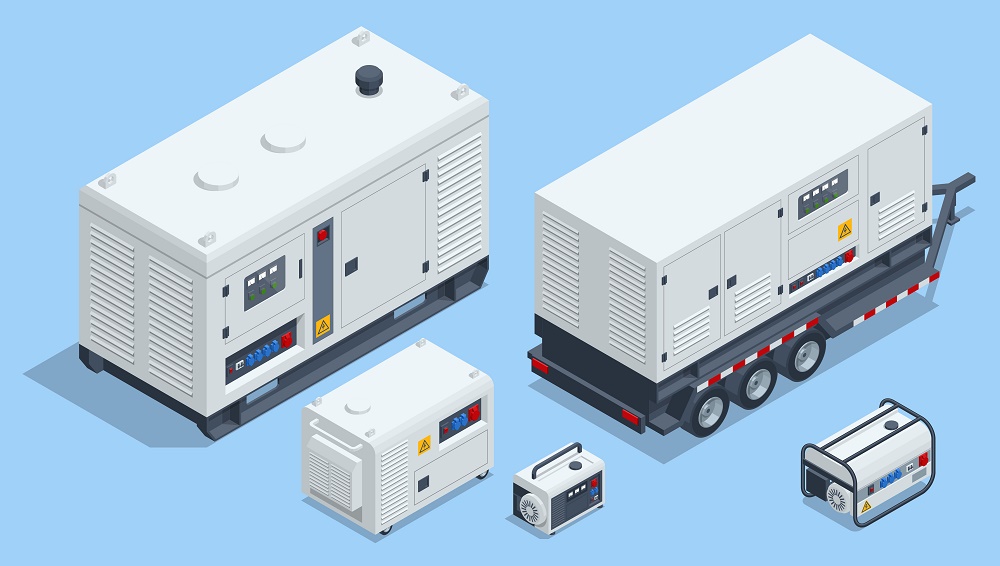Many people often confuse standby and portable generators because both provide backup power in a power outage. That being said, although they both serve the same purpose, they differ significantly in terms of power capacity and functionality.
There are many differences and factors to take into consideration when deciding which generator is best suited for your needs. Read on to learn more about the difference between standby generators and portable generators, and which option may be best suited for you.
Standby Vs. Portable Generators
Both standby generators and portable generators can be useful in a power outage. When choosing between a standby or portable generator, consider the specific needs of your home or business. What type of backup power do you need in the event of a power outage? We’ll help you determine the best option for your needs below.
Standby Generators
A standby generator is designed to automatically provide power during a power outage. The system – in standby mode – constantly monitors utility power 24/7/365. The automatic transfer switch (ATS) will detect a power failure and will send a signal that automatically disconnects from utility feed wires, connects generator feed wires, and starts the generator engine.
The home or business connected to the generator will then receive power and experience minimal interruption. When utility power is restored, the ATS will switch back to utility feed wires and return itself to standby mode.
Portable Generators
A portable generator, also known as a backup generator, does not offer automatic outage detection. When utility power fails, the business owner or homeowner must start the generator‘s engine manually. Power is then available to selected appliances by setting up extension cords directly from the backup generator to the needed appliance.
So, What Are the Main Differences Between a Standby and Portable Generator?
Power
Standby generators are more powerful than portable/backup generators. They can handle much larger loads for longer periods of time. This makes them a great option if you’re looking for a generator to power an entire home or commercial building during an outage.
Portable generators are designed for smaller-scale use, such as providing temporary power for specific appliances or tools. In terms of power, a generator within the 22-29 kW range can be used to power household appliances and healing and cooling. For commercial use, a 22-29 kW generator is best for small to medium size businesses. Larger businesses will typically require a generator with a higher power output.
Installation
Standby generators are installed outside homes or buildings and can be directly connected to the building’s electrical system. This allows the generator to automatically turn on in the event of a power outage. Portable generators do not require installation. Much like the name suggests, they are portable – meaning they can be moved around. This allows for flexibility in how and where they can be used.
Fuel
Standby generators are typically connected to a home’s natural gas line or a large propane tank. This ensures constant and reliable fuel supply. Portable generators run on gasoline, diesel, or propane, which may require manual refueling and can be less reliable during extended power outages.
Cost
Because standby generators have a higher power capacity and must be installed, they are more expensive to purchase and maintain. If you do not require much power capacity, portable generators are a more affordable and cost-effective solution for short-term power outages.
Standby Vs. Portable Generators: Other Considerations
Most standby generators will exercise themselves at regular intervals that can be set by the homeowner or business owner. During a short run, perhaps 12 minutes, the standby generator will lubricate its engine, charge its batteries, and run a diagnostic check. Some models may even alert the owner immediately to any potential problems.
A portable generator will require the owner to run periodic maintenance and diagnostics to ensure that it remains in perfect working order and is ready for use at any moment.
Owners of standby generators, which are permanently installed and automatically engaged, are less affected by weather conditions when the device is needed. Owners of backup/portable generators will need to store, retrieve, and manually switch the generator on, often during severe weather conditions, which can be problematic.
Contact RP Gas Piping to Explore Generator Options for Your Home or Business
Whether you decide on a standby generator or portable generator, we recommend using natural gas or propane gas as a fuel source. At RP Gas Piping, we help people in Phoenix, Arizona, and the surrounding area with all their natural gas and propane gas needs. We can help you plan and install gas line piping and propane storage tanks. If your home or business cannot afford to be without power, then a generator and gas fuel supply can alleviate your concerns and safeguard your loved ones. Learn more by contacting us today.
Liked this article? Here are three more!
Gas Line Inspection and Permits: Important Information
Natural Gas vs Electricity: Which is More Cost Effective?
3 Reasons to Schedule an Annual Master Gas Meter Inspection
This article was originally published in 2011 and updated for 2023.


